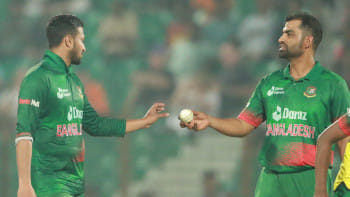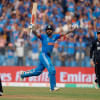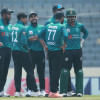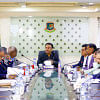The fish rots from the head down

Rifts among big-name teammates are not uncommon in cricket history. From Garfield Sobers versus Rohan Kanhai to Sunil Gavaskar versus Kapil Dev to Virender Sehwag versus MS Dhoni, there have been several notable incidents that sparked debate among fans. Much was said about how a cherished friendship between the two Ws – Wasim Akram and Waqar Younis – had devolved into hostility.
Sports teams are frequently portrayed as happy families, and most teams try to carefully maintain an image. But in reality, friction among teammates is part and parcel of most team sports. Bangladesh's cricket squad is no exception.
In keeping with that history, it was nothing extraordinary when the story of the rupture between Shakib Al Hasan and Tamim Iqbal made the news. But what happened before the Bangladesh team left for India to compete in the ICC Men's World Cup was a disgrace for the country's cricket.
It must have been hard for Bangladesh fans to envisage a player blatantly questioning his long-time comrade's dedication to the nation. Who is to blame for the unpleasant episode between the two stalwarts?
Supporters swarmed social media with support for their respective favourite hero. However, we must also investigate whether a defective system played a role in this ugly occurrence, when the seed of this rift was sown many years ago.
Cynics often claim that Bangladesh cricket is more prominent off the field than on it. Shakib-Tamim's recent feud certainly pushed matters that way.
The whispers of a bitter drift between the country's two best cricketers of their generation became a roar in February, when Bangladesh Cricket Board (BCB) president Nazmul Hassan Papon revealed – the first time any board official did so – that the suspicions were warranted.
Bangladesh skipper Shakib fired on all cylinders during a two-part interview with T Sports, aired on September 27 and 28, following Tamim's declaration that dirty politics behind the scenes resulted in his exclusion from the World Cup squad.
Tamim's inclusion/exclusion drama, which occurred just a few days before the showpiece event, was unique in world cricket. Apart from putting team harmony in jeopardy before the World Cup, it has done irreversible damage to the spirit of the next generation of players. One thing is certain: the two will be remembered not only for their individual geniuses, but also for all of the distasteful controversies linked to them that have occurred in recent years.
Tamim and Shakib, time and again, renewed hope for Bangladesh cricket with their performances throughout the years, and were frequently grouped with Mushfiqur Rahim, Mahmudullah Riyad, and former captain Mashrafe Bin Mortaza as the "fabulous five." Coach Mohammad Salahuddin, mentor to both players, is undoubtedly correct to ask that, while they may have many individual achievements, how much have they accomplished for the team?
The way in which the situation unfolded demonstrated how damaging, deep-rooted, and downright suicidal their relationship has been; how ego trumped the national team's interest in both their eyes.
After Tamim's retirement/un-retirement saga in July, followed by the left-hander's hard work in rehabilitation programmes, and a fine 44-run innings against New Zealand in Mirpur, everything appeared to be in order. Fans were thus left speechless when it was announced that Tamim would not be attending the World Cup. Besides dirty politics, Tamim also claimed, in the video statement on his Facebook page, that many lies were spread in the media to mask the truth and that a phone call from a top board member led to the tipping point.
Tamim, to his credit, didn't point the gun at anyone. One may condemn him for a variety of reasons relating to the game itself, but no one can accuse him of indecency.
Tamim's inclusion/exclusion drama, which occurred just a few days before the showpiece event, was unique in world cricket. Apart from putting team harmony in jeopardy before the World Cup, it has done irreversible damage to the spirit of the next generation of players. One thing is certain: the two will be remembered not only for their individual geniuses, but also for all of the distasteful controversies linked to them that have occurred in recent years.
Shakib, on the other hand, did not display any decorum, slamming Tamim during his two-part interview. Shakib voiced several arguments against Tamim, and one may agree or disagree with them. But his behaviour towards a fellow teammate was not only unprecedented, but also shameful for the country's image in the sport.
Most importantly, he questioned Tamim's dedication to the national team and pointed a finger at someone against whom there have hardly been any major disciplinary accusations, and someone who once set a remarkable example by batting with a fractured hand.
And all this came from a player who was barred from all forms of cricket for two years for failing to notify the ICC's anti-corruption unit (ACU) of three separate "approaches or invitations" to engage in "corrupt conduct" by a bookmaker seeking match information, as well as being involved in other disciplinary issues.
Former skipper Mashrafe, via social media, rightly pointed out three major reasons behind this chaos: 1) Tamim's emotions (as he could have handled the call from a board high-up differently); 2) Shakib's ego (as he could have given Tamim a call to sort things out); and most importantly 3) lack of proper management.
How did once-close friends become enemies? There is no simple answer to this question, because it was caused by a number of variables – or the presence of a proverbial third party who may be gaining from conflict between the two individuals – which must be investigated in depth.
In ideal circumstances, Tamim and Shakib would not have opened this can of worms, had there been a proper code of conduct in place. But given the reality, it seems too much to ask for since the board itself failed to follow procedure when it came to handling our national cricket team.
When a board official calls a national player to discuss his batting position, and has frequently spoken to the media about technical concerns regarding the team, it can be hypothesised that the chaos often surrounding our cricket is of a trickle-down nature.
Bishwajit Roy is the sports editor of The Daily Star.
Views expressed in this article are the author's own.
Follow The Daily Star Opinion on Facebook for the latest opinions, commentaries and analyses by experts and professionals. To contribute your article or letter to The Daily Star Opinion, see our guidelines for submission.

 For all latest news, follow The Daily Star's Google News channel.
For all latest news, follow The Daily Star's Google News channel. 











Comments